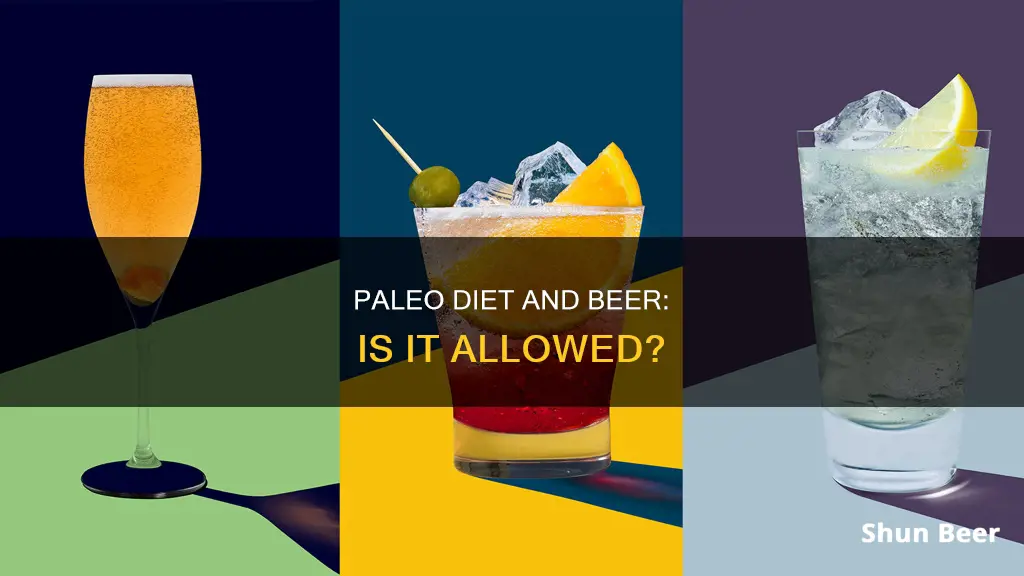
The paleo diet is based on eating foods similar to those eaten by early humans during the Paleolithic era. As our ancestors didn't have the technology to process alcohol, it's not technically a paleo-approved drink. However, as with most diets, there is room for flexibility, and many proponents of the paleo diet believe that a moderate amount of alcohol is acceptable. Beer is typically avoided on the paleo diet as it's made from grains and contains gluten. Wine and spirits are considered better options, with red wine often touted as the healthiest choice due to its antioxidant content. However, it's important to remember that alcohol is processed and can be toxic to the liver, so consumption should be limited to occasional drinks.
| Characteristics | Values |
|---|---|
| Is beer paleo-friendly? | No |
| Why? | Beer is made from wheat, barley, and hops, which are grains that contain gluten. |
| Paleo-friendly alcoholic drinks | Wine, hard cider, spirits |
| Alcohol's effect on health | Alcohol is toxic to the liver, addictive, and dehydrating. It can also cause a rise in blood fats and affect electrolyte balance. |
| Alcohol's effect on sleep | Alcohol disrupts sleep, especially if consumed 2-3 hours before bedtime. |
| Alcohol's effect on weight loss | Alcohol stalls weight loss as it contains a lot of calories. |
| Alcohol's effect on blood sugar | Alcohol causes a dip in blood sugar. |
| Alcohol's effect on fat metabolism | Alcohol delays fat metabolism. |
| Alcohol's effect on nutrient uptake | Alcohol causes the liver to prioritise detoxification over the uptake of nutrients. |
| Alcohol's effect on toxin processing | Alcohol causes the body to store some toxins as fat. |
What You'll Learn

Beer is not paleo-friendly
The paleo diet avoids grains, legumes, and dairy products. Beer is made from grains and is, therefore, not a paleo-friendly drink. Even gluten-free beer is made from gluten-free grains, which are also avoided on the paleo diet.
If you are looking for a paleo-friendly drink, wine and spirits are better options. Wine is often considered the closest thing to a paleo-friendly alcoholic drink. Red wine, in particular, has antioxidants such as resveratrol, which can help prevent damage to blood vessels, lower "bad" cholesterol, and prevent blood clots. White wine, on the other hand, removes the skin and tannins from the grapes, resulting in a lighter colour but also removing the resveratrol.
When it comes to spirits, vodka, gin, and tequila are said to be the best choices within paleo parameters. Vodka is traditionally distilled from potatoes, although some are made from grains or grapes. Gin is distilled from botanicals like juniper, coriander, or cinnamon, so you can enjoy this clear liquor with little concern. If tequila is your drink of choice, make sure you're looking for one that is made from 100% agave.
While beer is not paleo-friendly, there are other alcoholic beverages that can be enjoyed in moderation as part of a paleo lifestyle. It is important to remember that alcohol is processed and not technically paleo-approved, but many experts believe that a moderate amount is consistent with the health goals of the paleo diet.
Energy Drinks vs Beer: Which is More Harmful?
You may want to see also

Wine is considered paleo-friendly in moderation
Wine is one of the most paleo-friendly alcoholic drinks, and red wine, in particular, is often considered a healthy option. This is because wine is made from gluten-free fruits (grapes) instead of grains. Red wine also contains an antioxidant called resveratrol, which has been shown to protect against inflammation, lower "bad" cholesterol, and prevent blood clots. White wine, on the other hand, is made by removing the skin and tannins from grapes, which gives it a lighter colour but also removes the resveratrol. Therefore, red wine will give you more antioxidants than white wine.
Wine is also considered paleo-friendly because it is likely that ancient humans fermented their own fruits and created a form of wine. Wine is also one of the oldest types of alcohol to see widespread human use.
However, it is important to note that wine does contain a good deal of sugar, which is the perfect food source for yeast. Additionally, wine manufacturers often add sulfites to wine as preservatives to extend shelf life. While most people don't have an issue with sulfites, they may be negatively impacting your health without you realising it. Therefore, if you want to drink wine, it is best to stick to organic, sulfite-free, and low-alcohol red wines.
While wine is considered paleo-friendly, it is important to remember that alcohol is not technically paleo. Alcohol is processed and toxic, and it is unlikely that ancient humans consumed alcoholic beverages. However, many experts now believe that a moderate amount of alcohol is OK and is still consistent with the health goals of the paleo diet. Therefore, it is important to consume wine in moderation and be cautious about the type of wine you choose.
Beer and Low-Residue Diets: What You Need to Know
You may want to see also

Spirits are a better choice than beer
While alcohol is not strictly considered paleo, it is possible to make more paleo-friendly choices when it comes to drinking. Beer is generally considered the least paleo-friendly option due to its gluten content. Gluten-free beer and cider are better alternatives, but they may still contain carbohydrates and sugars. Spirits, on the other hand, are considered a better choice than beer. The distillation process removes most of the gluten protein residue from the grains, and some spirits like bourbon, brandy, and cognac contain helpful antioxidants.
When choosing spirits, it is best to opt for dry and clear options such as vodka, gin, and tequila. Vodka distilled from potatoes or grapes, such as Ciroc or Chopin, is preferable to those made from wheat, such as Grey Goose. For tequila, look for brands that are advertised as "100% agave." Gin is also a good choice, as it is typically distilled from botanicals like juniper, coriander, or cinnamon.
In addition to choosing the right type of alcohol, there are other factors to consider to minimize the negative effects of drinking. It is important to avoid sugary mixers and instead use club soda or soda water. Adding a wedge of lemon or lime can enhance the flavor and improve insulin sensitivity. Eating a high-protein, low-carb paleo meal before drinking and having paleo snacks on hand can help prevent binge eating. It is also crucial to drink in moderation and stop drinking a few hours before bedtime to minimize disruptions to sleep.
A Day in the Life of a Brewery Worker
You may want to see also

Cider is a good alternative to beer
Secondly, cider is made from real fruit, typically apples, which are naturally sweet. This gives cider a range of taste profiles, from fruity to dry, with various levels of acid, tannins, and sugar. Beer, on the other hand, is made from water, wheat or barley, yeast, and flavouring agents, and often has added sugar.
Thirdly, cider is often locally produced, supporting local agriculture. Beer, on the other hand, is usually made with imported grains.
Cider also has some health benefits. It contains polyphenols, natural compounds that improve blood pressure and cholesterol. Cider also aids digestion and improves gastrointestinal health. It can also help to relax you and improve your mood, in a similar way to beer.
However, it is important to note that cider tends to be higher in sugar and carbohydrates than beer, so it may not be the best option if you are watching your weight. It also has a similar number of calories to beer, at around 200 per bottle or can. Therefore, while cider is a good alternative to beer in some ways, it is still important to consume it in moderation.
Beer and Acetaminophen: Is It Safe to Mix?
You may want to see also

Alcohol is toxic to the liver
The liver processes over 90% of consumed alcohol, and the rest exits the body via urine, sweat, and breathing. It takes the body about an hour to process one alcoholic beverage, and this time frame increases with each drink. When someone has too much to drink, the alcohol left unprocessed by the liver circulates through the bloodstream, affecting the heart and brain, leading to intoxication.
Chronic alcohol abuse causes the destruction of liver cells, resulting in scarring of the liver (cirrhosis), alcoholic hepatitis, and cellular mutation, which may lead to liver cancer. These conditions usually progress from fatty liver to alcoholic hepatitis to cirrhosis, although heavy drinkers may develop alcoholic cirrhosis without first developing hepatitis.
Drinking a large volume of alcohol can cause fatty acids to collect in the liver, leading to alcoholic fatty liver disease. There are usually no symptoms, and this condition is often reversible if the individual abstains from alcohol. However, if a person continues to drink alcohol, it will lead to ongoing liver inflammation, which can occur after many years of heavy drinking or during periods of binge drinking.
Alcoholic hepatitis is a severe syndrome of alcoholic liver disease, and common symptoms include jaundice, an enlarged liver, and features of a systemic inflammatory response. Alcoholic hepatitis usually progresses to cirrhosis if a person continues to drink alcohol. Cirrhosis is a life-threatening condition where the liver has been inflamed for a long time, leading to irreversible scarring and loss of function.
Alcohol-related liver disease is caused by drinking alcohol, usually over a sustained period. It is a spectrum of disease that consists of three stages, each increasing in severity and the risk of developing liver cancer. The early stages of alcohol-related liver disease can be difficult to identify, as there are usually no symptoms. However, reducing alcohol consumption can help reverse damage and lower the risk of disease progression.
Hamsters and Beer: What's Safe to Drink?
You may want to see also
Frequently asked questions
Technically, alcohol is not paleo-approved. However, as with most diets, flexibility is common and many proponents of the diet and nutrition experts alike recognise that devotees want the occasional drink, and therefore advocate a moderate approach.
Beer is the worst type of alcoholic drink you can have on the paleo diet. It is made from grains like barley and wheat, which are packed with gluten. Wine and spirits are considered better options.
Alcohol is toxic to the liver, it is an addictive drug, and it can cause a dip in blood sugar and a rise in blood fats. It can also affect electrolyte balance and cause dehydration.
No alcoholic drink is completely paleo-friendly. However, some options are more paleo-compliant than others, such as red wine, vodka, gin, and tequila.
It is recommended to limit alcohol consumption to one or two drinks per day, choose non-grain-based spirits, and avoid mixers that contain sugar or artificial sweeteners. Eating a high-protein, low-carb paleo meal before drinking and having paleo snacks on hand can also help. Staying hydrated by drinking water between alcoholic drinks is also important.







